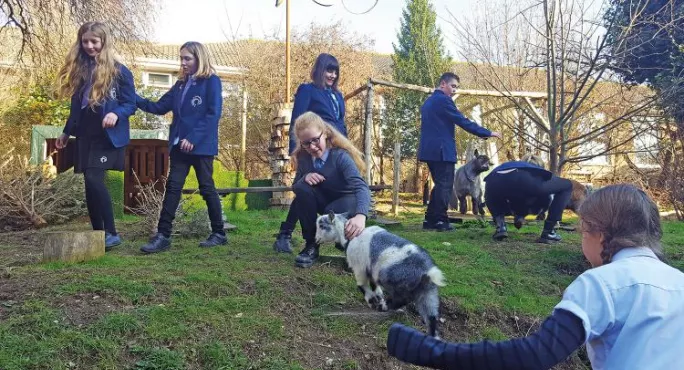They may be less than 3ft tall, but the latest recruits at Varndean School, Brighton, are having a big impact on behaviour.
Maya, Bertie, Alan, Ethel and William are pygmy goats whose role has expanded beyond being mere school pets and grass-cutters.
The secondary has also decided to use “goat time” for students who are at risk of misbehaving in class - and has found that behaviour incidents have dropped dramatically since their arrival in September.
‘De-escalating’ challenging behaviour
Hilary Goldsmith, who joined Varndean as director of finance a year ago, brought the goats in after noticing that an enclosed grassed courtyard could do with being grazed.
“There are definitely students for whom we use goat time as a de-escalation technique, and for whom we have noticed a significant change in engagement and behaviour,” she said.
And while the school is not claiming to have scientific proof that goats improve behaviour, its records do show that behaviour incidents have fallen by 29 per cent compared with the same period (September to January) last year.
“As a school we always try to use a restorative approach to dealing with behaviour incidents,” Ms Goldsmith said. “So you might well find a member of staff taking a student out to the goats’ quad to have a restorative conversation in a neutral environment.”
Take me to your ‘goat leader’
There is a school goat club with 100 members that has sprung up to help care for the animals and there are also badges for students who are particularly dedicated to their welfare. The animals have starred in student films, been the subject of poems and one girl made Christmas stockings for them. Four students are now designated as “goat leaders”, and turn up every day to do the feeding and cleaning.
The positive impact of the goats does not surprise John Murray, an education consultant specialising in behaviour.
“There is a long tradition in schools of using animals to develop behaviour and emotional regulation in children,” said Mr Murray, the founder of Jogo Behaviour Support. “Traditionally, the animals used may have been guinea pigs, hamsters and goldfish.
“However, the use of pygmy goats seems to be a very creative response by the school to support the children to engage in their learning environment when it may be a challenge to do so, developing skills such as empathy, responsibility and taking the needs of others into account.”
Follow the goats on Twitter @varndeangoats
This is an edited article from the 3 February edition of TES. Subscribers can read the full article here. This week’s TES magazine is available in all good newsagents. To download the digital edition, Android users can click here and iOS users can click here
Want to keep up with the latest education news and opinion? Follow TES on Twitter and like TES on Facebook




